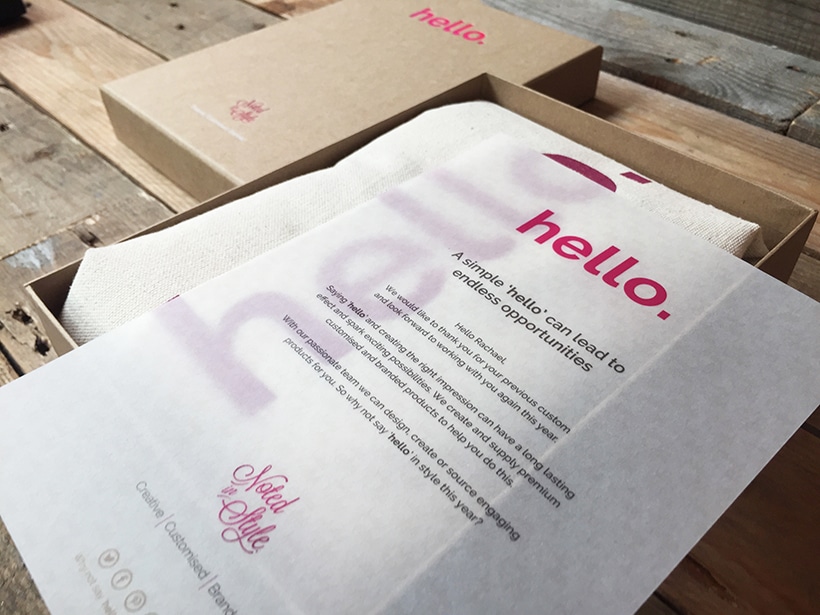May 2, 2016
I recently attended the Digital in Kent conference with about 80 or so other delegates. One of the trends identified in the conference is that the business world is now much more about smaller enterprises than large corporations. Thomas Power, CDO of Electric Dog commented, “You need to use your heart and your head in your communications. People don’t want corporate any more, they want personal. We must get small and community driven.”
This more personal and community driven approach to marketing should not be limited to the world of digital communications, it can apply to traditional channels too. Promotional products offer a high rate of return on an advertising investment and are fantastic for the drive towards ‘personal’ communication because they reach out to customers and clients directly, offering a tactile and lasting experience. However, simply giving someone a gift isn’t necessarily personal enough on it’s own, you need to think about the recipient on a deeper level and about the relationship or potential relationship between the recipient and your business to get the best out of your investment.
Here are 5 key factors you should consider to make sure your promotional product has a personal connection with the recipients and helps your business stand out from the crowd:
1. Really think about the end user – take more than a fleeting moment to consider what your customers might actually want and value. What are their ages, their jobs, their lifestyles or interests likely to be. Even if your audience is a mixed bag, there are often some commonalities that emerge if you take a while to analyse.
2. Keep longevity in mind – useful is the way to go. Research has shown that 89% of people will keep a promotional product if it is useful. Choose an item that will be used regularly by your audience so that your brand message remains at the forefront of the recipient’s mind. Of course this factor is inexorably linked to No 1 above, as what may be useful to some would be pointless to others. New mums may use a baby bib every day, but that’s probably not the product to go for if your audience is all 18-21 year olds!
3. Personalisation is important – a personal touch can often be the real difference that sets you apart from your competitors. These days personalisation can be done on small runs and need not cost the earth. A personal message on or with a product can turn an average gift into something cherished. One of our customers sent notebooks to business people as a thank you for their custom during the year and in each book the first page had a personal message to the named recipient from their regular contact at the company – many with a personal joke, reference to a social time they had shared or regards being passed on to the persons family. This was not costly or difficult and would have been hugely valuable in terms of relationship building.
4. Stand out from the crowd – try not to be a sheep! Aim for something a bit different that will set you apart. Just because all your competitors or others in your industry opt for a particular type of product, that doesn’t mean you have to or should. Even if you do go for a tried and tested item, you can make it stand out by opting for a unique design and creative branding options so that the recipient see’s the item as being a bit more interesting or special than usual. Just a warning here – don’t go too crazy with the idea of being ‘different’ so you end up in the realm of “fad” items – it needs to be something that won’t go out of date too quickly otherwise you’ve counteracted No 2!
5. Match the gift to your brand – whilst focus on the recipient is essential, considering your brand identity is as important, but often overlooked. You MUST choose a product that reflects the ethos of your brand. A product that is inconsistent with your identity and values may do more harm than good. A green/ecological focused company should ensure it opts for a re-usable or recycled product with longevity rather than a disposable product for example. A British tailor that trades on it’s heritage shouldn’t select a product with Made in China stamped on it. No matter how nice or expensive the items given away are, such errors can destroy your efforts. And remember, a cheap/poor quality product says that your company does not have quality at the top of its agenda.
So there you have it. Keep these 5 key points in mind you’ll keep the gift personal and should ensure that you get maximum return on your investment. You’ll also ensure that your customers don’t have to use their ‘gift face’ too!
Of course, if you find yourself a good supplier (;-) they should automatically address the above points and help you to select the right promotional product and customise it to reflect your brand in ways that you might not even have thought about.
By Ellie – #GiftFace by Ben



